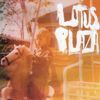 While I do not have any particular animosity towards Deerhunter, I've always felt that the enthusiasm they generate seems to be disproportionate to the quality of their music. Consequently, my expectations for guitarist Lockett Pundt's Lotus Plaza solo project were not especially high. I turned out to be pleasantly surprised though. He has managed to produce a couple of memorably warm and artfully blurred pop gems here. I suppose I owe him an apology, but first he has to apologize for sabotaging his debut album with so much filler.
While I do not have any particular animosity towards Deerhunter, I've always felt that the enthusiasm they generate seems to be disproportionate to the quality of their music. Consequently, my expectations for guitarist Lockett Pundt's Lotus Plaza solo project were not especially high. I turned out to be pleasantly surprised though. He has managed to produce a couple of memorably warm and artfully blurred pop gems here. I suppose I owe him an apology, but first he has to apologize for sabotaging his debut album with so much filler.
Kranky
The album's cover (a hazy, washed-out photo of a young boy on a rocking horse) provides an excellent clue to the tone of the music contained within. This is a summery, soft-focus affair that evokes vague feelings of warmth and nostalgia. At least it does during its better moments, when it sounds vaguely like how I imagine The Jesus and Mary Chain would've sounded if they'd relocated to California and given up heroin for bongs and beaches.
"Red Oak Way" starts the album in strong and attention-grabbing fashion: a simple garage rock drum pattern leads into a steadily escalating swell of chiming arpeggios, melodic vocals, and lazy endlessly repeating and wordless backing vocals. While the track has undeniable immediacy and catchiness, repeated listens reveal additional depth (many studio-tweaked percussion flourishes and vocal tracks that pile-up and harmonize beautifully) that I did not expect. This is important and conveys to me that Lockett Pundt is no fool. The sleepy, blurred feel of The Floodlight Collective required Pundt to reverb everything to death (especially the vocals), which causes the songs to suffer greatly in character, immediacy, and general ballsiness. However, the album’s inherent shortcomings are (almost) ingeniously compensated for by muscular drums, thick propulsive bass lines, and dub-inspired studio wizardry. This approach works extremely well here, but unfortunately the opening track is the best on the album.
The second track, “Quicksand,” is also noteworthy, although I initially found it to be a disappointment. It starts off with too much clutter and sounds like a failed, less melodically gratifying variation of the “Red Oak” formula. However, after about two minutes, Lundt surprised me by dropping all the tracks of shimming guitar noise and leaving only shuffling drums and a simple and clean melancholy guitar part. The effect is quite striking and makes me forgive the song’s clumsy start. Then the roaring, ringing, and guitar layers start piling up again, but this time they work beautifully and the song builds to a lazy crescendo of sorts.
"Sunday Night" begins in spectacular fashion with throbbing and squelching electronic percussion coupled with repetitive, minimal, Steve Reich-y ringing guitar and a simple melodic bass line. This groundwork never changes, but is slowly built up with layer after gauzy layer. A complex arsenal of feedback, noises, swooping guitars, and mournful vocals burbles in and out of the mix and relentlesslessly builds to a climax of uncharacteristically raw and melancholic harmonized vocals. Oddly, it never coheres into a truly great song, but Pundt certainly manages to pack more awesome sounding stuff into one song than many bands have on their entire album.
One striking thing about The Floodlight Collective is that there seems to be two strongly conflicting impulses at work here. The vocals are sleepy and mumbled-sounding, buried in the mix, and absolutely swathed in reverb, which renders most attempts to decipher the lyrics or connect with the songs utterly hopeless. Nevertheless, the songs are extremely melodic and tightly structured and the omnipresent tambourine and rockabilly-flavored drumming can be best described as "bouncy". In fact, the whole album is unexpected driven by the rhythm section- not at all what I would anticipate from a guitarist's solo project. Pundt's aesthetic seems to lie somewhere between self-sabotaging indie pop and drone music (but for parties). Either way, it works quite well on the poppier tracks.
Lamentably, the album wavers in quality a bit during more instrumental, "atmospheric" moments like “These Years” and the title track. There is nothing particularly unfortunate about them, but they veer into territory that other artists have tackled more impressively and they tend to drain the album's momentum. The fatal flaw of the album is, perversely, its own aesthetic. Despite his best efforts, Pundt’s reverb-mongering causes the album to feel somewhat endless and same-y. When heard on their own, songs like “Red Oak Way” and “Sunday Night” are unique, head-turning, and wonderful, but attempting to listen to this entire album is an endurance test that will make those around you beg for something else to be put on. This could have been an absolutely scorching EP.
Samples:
Read More

